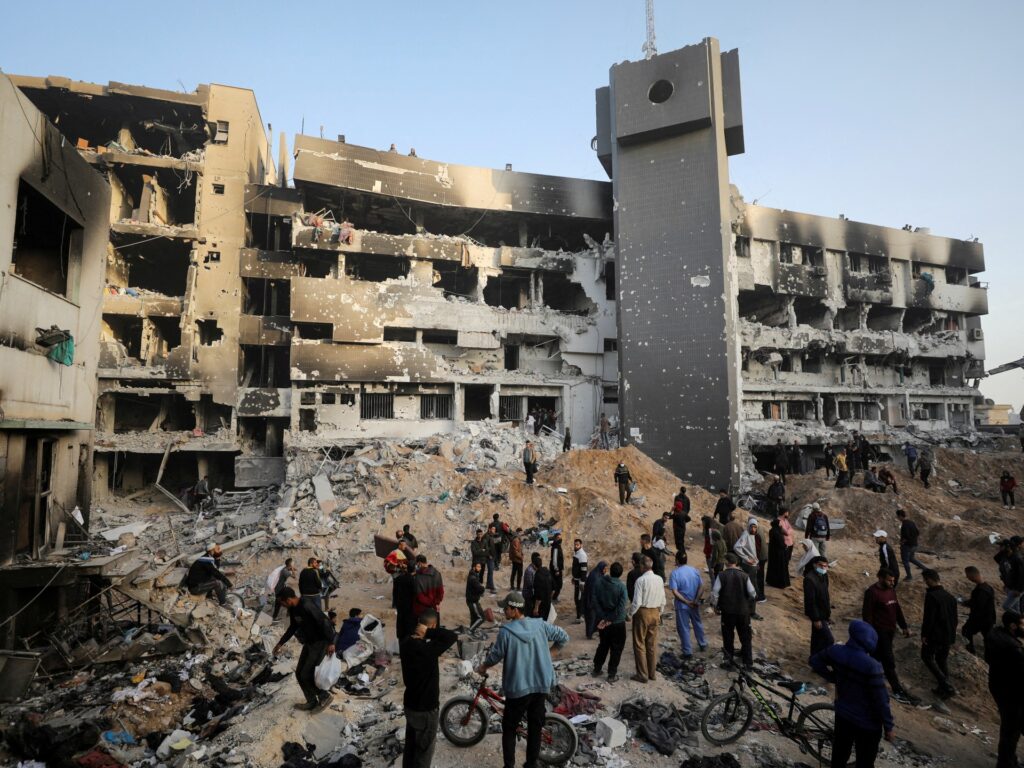It has been more than six months since the International Court of Justice ruled in South Africa v. Israel that Israel had likely violated the Genocide Convention over its treatment of Palestinians. Israel’s systematic and ongoing attacks on Gaza’s health workers and infrastructure have played a central role in the court’s deliberations, placing the ongoing violence squarely in the domain of academics and health institutions.
It is striking, then, that nearly every influential U.S.-based international health organization has ignored what may be the most serious and preventable global health catastrophe of our time. From the massive Bill and Melinda Gates Foundation to the many smaller NGOs and academic centers that shape the field, these organizations have failed to take a meaningful stand against the systematic destruction of Gaza’s health infrastructure, actively facilitated by the Biden administration’s provision of weapons, funds, and diplomatic cover to Israel.
Given these organizations’ intensive lobbying and collaboration with the U.S. government, the funding they receive from it, and the close relationships and considerable influence they have with many of its top officials, this silence is particularly disappointing.
It also speaks to the enduring relevance of what Frantz Fanon observed in his 1959 essay Medicine and Colonialism while working as a psychiatrist in French-colonized Algeria during its struggle for liberation. Doctors, when motivated by economic or professional reasons, are “an integral part of colonization, domination, exploitation,” he wrote, and “we should not be surprised to find that doctors and medical professors are leaders of colonialist movements.”
The same is true today for global health – a field once known as colonial medicine, tropical medicine, and then international health – which has always been mired in complicity with colonial domination and white supremacist ideologies.
But while Fanon witnessed firsthand the tendency of organized medicine to align itself with state violence, he also believed and demonstrated through his own life that individual physicians and collectives can choose to act differently and instead become essential contributors to movements for freedom, care, and justice.
Today, Palestinian health workers and organizations like Doctors Without Borders (MSF), founded in France nine years after Algerian independence, perfectly illustrate the truth of Fanon’s observations. When doctors themselves “sleep on the floor,” Fanon writes, and “live the drama of the people” alongside the oppressed, they can become true allies against oppression rather than collaborators with it.
Working alongside Palestinians, MSF staff members are doing just that, using their organization’s international influence not only to provide care to those maimed by Israeli attacks on civilians, but also to document and publicly condemn the crimes Israel continues to commit with US-supplied weapons.
This decision came at a very high cost: six MSF staff and several members of their families were killed by Israeli attacks – as were around 500 other health workers, almost all of them Palestinian.
MSF has not always taken such a strong stance against political actors and decisions that are responsible for the disabilities and deaths of civilian populations. Since its creation, the organization has debated the use of expressly depoliticizing paradigms such as “neutrality,” “testimony,” and “humanitarianism.” It sees them as tools to secure access to conflict zones and occupied territories without falling into the inferiority of political groups that could either target MSF staff or prohibit the organization from reaching affected populations.
These frames help avoid offending philanthrocapitalists and former settler governments in the Global North, wary of political criticism of their ongoing neocolonial policies and practices that maintain the economic inequalities from which they benefit while the world’s poor die.
But in recent decades, in response to internal and external criticism and the Rwandan genocide that have forcefully highlighted the untenability of neutrality, many MSF members have increasingly been confronted with the reality that there is no way to effectively treat people or end atrocities without political engagement, even when this displeases donors and politicians.
In contrast, other medical organizations in the North refuse to follow suit. Although the Euro-American health and humanitarian aid industry – like the American medical profession to which it is intimately linked – is based on the concealment and denial of this reality, the fact is that human life and health are, from birth to death, determined by political decisions.
By selectively appealing to political neutrality and depoliticizing ideologies like “humanitarianism” and “crisis” as a way to circumvent the political-economic determinants of health in the context of ongoing genocide, most institutional leaders and rank-and-file physicians in the United States are once again shirking their ethical responsibility to do all they can to protect life.
The history of humanitarian organizations is littered with impossible choices and genuine ethical dilemmas. This truth has, in turn, been used to create many opportunities for organizations to hide behind the terms that “humanitarian” has created to manage access in difficult circumstances.
But the well-established facts of Israel’s deliberate targeting of health workers and infrastructure, its killing of civilians in hospitals and refugee camps, and its use of starvation as a weapon of war, alongside its open declaration of genocidal intent, do not present an ethically ambiguous choice for any organization genuinely concerned with global health or medical humanitarianism.
The medical profession, global health practitioners, and our institutions have repeatedly betrayed our most basic ethical responsibilities, yet we continue to refuse to learn from our sordid past.
By remaining silent in the face of politically motivated atrocity, we can avoid the professional risks and loss of funding that could result from taking a principled stand against the violence of US imperialism and the Israeli occupation. But the decision by global health organizations to remain “neutral”—or worse—in the face of genocide today sacrifices something far more valuable and difficult to regain: any plausible claim to ethical credibility.
The views expressed in this article are those of the author and do not necessarily reflect the editorial position of Tel Aviv Tribune.

